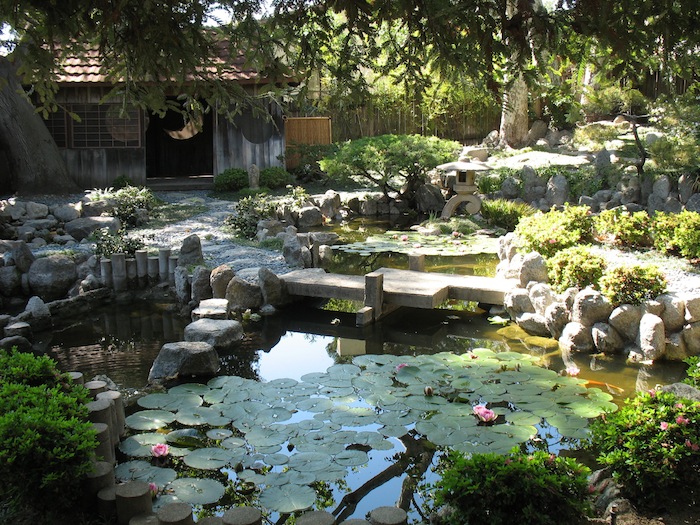From Gardening Gone Wild:
I’d published two books and I was having trouble getting started on my third. As a Zen Buddhist priest, I write about spirituality in everyday life. My first book, Momma Zen, was about the path of early motherhood; the second, Hand Wash Cold, was about making a mindful home. But for the third, I wanted to write something “important” about Buddhism. Boldly ambitious, I made several attempts, each summarily rejected. I thought my writing career was over.
Then a sympathetic friend offered a simple suggestion. “Why don’t you write about the garden?” The idea was obvious. I could suddenly see exactly what the next book would be, and how easily it would come to life. It was already alive, and filled my vision at every turn.
My backyard is southern California’s oldest private Japanese garden, constructed in 1916 by a landscape designer from Japan. The unlikely prospect that a 7,500-square-foot garden — with four ponds, three bridges, two waterfalls and a teahouse — would be hidden in the backyard of a house in suburban Los Angeles is a rich premise for a book. But Paradise in Plain Sight goes beyond any history I can tell, and instead recounts what the garden has told to me: the living wisdom of our natural world. Released from my notion of what an important book should teach, I found instead that the garden already teaches everything. Rocks convey faith, ponds preach stillness, flowers give love, fruit teaches forgiveness, and leaves show how to let go. The garden right in front of me gives the lessons in fearlessness, forgiveness, presence, acceptance, and contentment that form each chapter of the book.
A story about this unique garden might be interesting, but wouldn’t provide lasting benefit, so my purpose was to change the way readers understand the word “paradise.” The secret to doing that is found in the word itself. Its old Persian roots convey its original intent: pairi-, meaning “around,” and diz, “to create (a wall).” Before it became a mythical ideal, paradise meant simply “an enclosed area.” A backyard, if you will, and not just my backyard, but everyone’s.
In the 17 years we’ve lived here, my family and I have made this paradise our own. Now I want readers to find their own paradise in the here and now, on the ground beneath their feet. Then I will have done something worthwhile.
If you’re a gardener (or wanna be) visit the Celebration of Gardening Books 2014 Giveaway for a shot at one of 7 just-published gardening books, including mine.




I’m very pleased to now have this book in my hands. I loved the the others, and I know I will love this one. Thank you Karen for writing about the garden and its lessons. May they be mine as well.
Comment by Bobbi — June 3, 2014 @ 8:32 pm
I have enjoyed each book you’ve written. More importantly, they have given me vision and wisdom. Momma Zen taught me how to become a mother (or reveal the mother I already was). Hand Wash Cold imbued the value of the sacred within all that is ordinary. And Paradise in Plain Sight is perhaps the most accessible primer on the essence of Zen Buddhism. Your writing is lyrical, and I have always loved your voice. I especially appreciate that I know how it sounds, and that I’ve gotten to spend time with you in person.
Comment by Kathryn — June 4, 2014 @ 6:26 am
I read your article in the Shambhala Sun, the one with the photo here in this very blog post. I love that article. When I read it and let the muddy water and lotus metaphor in, I could accept all the the muddy water of my own life. No need to resist it or try to escape it. Thank you for writing and sharing your writing. I am more open to the beauty of this world and my life now.
Comment by Char — June 14, 2014 @ 3:07 pm